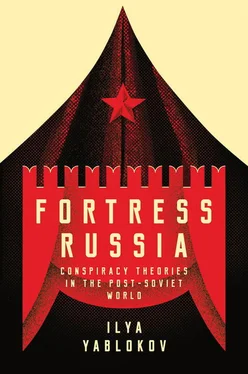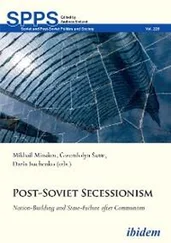In contrast to the first, the report and discussion in the second programme were aimed at explaining the global repercussions of the Pussy Riot case, with the narrative of ‘the war against the Church’ now relegated to a secondary position. This conceptual difference was even more evident in the third episode of the show, broadcast on 16 October, which was devoted to the ‘real’ reasons behind the performance. The band’s closest supporters were accused of having profited financially from the international campaign around Pussy Riot. Mamontov contended that the organizers of the performance wanted to become rich and famous by undermining Russia’s position in the international arena. Pussy Riot’s domestic supporters were depicted as greedy, two-faced ‘liberals’ who worked in close cooperation with Russia’s geopolitical enemies in Washington (Spetsial’nyi korrespondent: Provokatory-3, 2012). The scandal was depicted as a new form of ‘information warfare’ against Russia, which made much use of the Internet and non-government organizations within the country. This conspiratorial narrative was aimed at depicting Pussy Riot as part of a broader Russian opposition. Particular stress was placed on its cooperation with the West.
The perception of the Church now shifted: from being seen as the object of the attack, it was now portrayed as peacemaker able to mediate between social groups in Russia. In turn, these social groups were supposedly set against each other by the Pussy Riot performance. An episode in which two young people tried to set fire to a church but then changed their minds and repented was used to demonstrate that the Orthodox Church can bring about reconciliation (Spetsial’nyi korrespondent: Provokatory-3, 2012). This significantly altered image of the role of the church served to neutralize criticism of the Church’s complicity in the guilty verdict against Pussy Riot.
The Pussy Riot case demonstrates the ways in which conspiracy theories are used to promote national cohesion in Putin’s Russia. The debates on the state-aligned television channels about national identity, which were framed by anti-Western conspiracy narratives, have reflected the political challenges faced by the Kremlin. The aim of these debates has been to boost public support for the Kremlin’s actions. The vagueness of the nation-building agenda has allowed the authorities to interpret criticism of the regime as a threat to the nation itself, thus connecting two seemingly unrelated issues. The idea of a Western conspiracy and, in particular, of an America’s intention to undermine the Putin regime, has further reinforced the Kremlin’s argument that Pussy Riot represents a threat to the nation.
The Church played a supporting role by promoting Orthodoxy as the key element in Russia’s national identity. Patriarch Kirill and his aides were actively involved in mobilizing people in Putin’s support during his 2012 presidential campaign, and used conspiratorial language even before the eruption of the Pussy Riot controversy. This yet again demonstrates the close cooperation between the Kremlin and the leaders of the Russian Orthodox Church (Papkova, 2011). While they were working on the election campaign, representatives of the Church already started to refer to a division within the nation between the anti-religious, anti-state, pro-Western minority and the vast and loyal majority who professed Orthodoxy and supported the authorities.
The need to protect Orthodoxy from criticism at the beginning of the Pussy Riot debacle could be considered to be the core demand of the Church and the political authorities, and was, furthermore, used to downplay the scandals around the Patriarch himself which we referred to earlier. Anti-Western conspiracy theories about the ‘information war’ against the Church played a pivotal role in the combined efforts of the Church and the authorities to bring together the various groups in Russian society in support of the Church and to undermine the legitimacy of its critics. However, during the final stages of the court proceedings, the Orthodox aspect of the campaign faded away, with emphasis placed instead on the story’s political significance and the supposed foreign conspiracy which lay behind the Pussy Riot performance. The narrative of Orthodoxy under threat was replaced by attempts on the part of public intellectuals and politicians to justify the Kremlin’s policy in relation to the opposition, with the latter depicted as dangerous and alien. Hence the artificially-created majority of the ‘Orthodox people’, now represented as the core of the Russian nation, became a crude tool to be used by the Russian political establishment. It was just a tactical political move to draw attention away from the contentious issue of electoral fraud which was wrapped in nation-building rhetoric. Yet, these actions did not include any practical measures for facilitating national cohesion.
Attempts to construct a new Russian national identity based on the political interests of the elites in the 2000s had much in common with similar efforts made by the Yeltsin government in the 1990s. At that time the issue of national identity was used as an instrument for the promotion of political and economic interests and to ensure that self-serving political actors were seen as legitimate (Tolz, 1998). With some success, Putin’s government adopted the same strategy to mobilize Russian citizens and ensure their support for its actions. As Hutchings and Tolz (2015, p. 250) demonstrate, the Kremlin’s nation-building approach in the mid 2010s reinvented and applied both Imperial and Soviet ideas of national cohesion, even though in some respects they contradicted each other.
Analysing Surkov’s concept of Russia as a sovereign democracy provides us with an insight into how the political elites in Putin’s Russia use the nation-building agenda to solve specific political problems. Against the background of the Kremlin’s ambiguous nation-building policies, Surkov formulated the idea of a single community of ‘sovereign Russians’; incorporating elements of both imperial and civic models of national identity, it was hoped that his idea would appeal to the diverse groups within Russian society. Surkov’s engagement in the debates on Russian identity was triggered by a fear that Putin’s government could lose control over the country; the vagueness of the term ‘sovereignty’ provided Surkov and other politicians and pro-Kremlin intellectuals with considerable leeway in their definitions, and re-definitions, of the nation-building agenda and of the nation’s potential ‘Others’, in accordance with prevailing political goals.
Surkov’s reassessment of Russia’s relations with the West had a major impact on the conceptualization of Russian identity and the further dissemination of anti-Western conspiracy allegations. The depiction of the West as a competitor, rather than as an enemy, made criticism of the West – when framed within the conspiratorial narrative – a legitimate part of official political and media discourse. In the language of economic competition, Russia was a wealthy world supplier of natural resources, and this helped present the idea of Russian greatness in economic terms. This argument provided a new framework for fostering patriotic attitudes among Russians and, at the same time, helped to incorporate anti-Western conspiratorial notions into a debate about the economic interests of foreign companies and the West’s rapacious desire to help itself to Russian resources.
Anti-Western conspiracy theories became a key instrument for boosting Russia’s national cohesion. The notion of the ‘conspiring West’, competing with Russia for economic wealth and political power, helped to establish the contours of national identity. In the 2000s, Kremlin officials, as well as pro-government intellectuals, spent a great deal of time shaping the image of the USA as Russia’s major conspiring rival. Moreover, leading politicians themselves took part in the dissemination of conspiratorial ideas through the governmentcontrolled media. A focus on the USA, as Russia’s ultimate rival in the competition for dominance in global politics, has become a central feature in the construction of the image of ‘the Other’ which was crucial in defining who we, Russians, are and why we are different from Them, people in the West.
Читать дальше
Конец ознакомительного отрывка
Купить книгу












